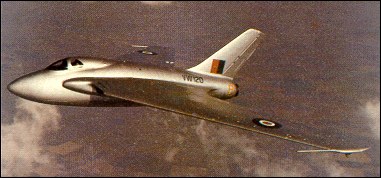|
| Built to Air Ministry Specification
E.18/45, the de Havilland D.H.108
was developed to conduct research into
the characteristics of swept wings in
support of the D.H.106 Comet and
D.H.110 programmes. The first prototype,
a standard Vampire fuselage
mounting a mid-set wing with a sweep
angle of 43°, and with elevons which
acted as elevators and ailerons (there
being no horizontal tail surfaces), was a
low-speed test vehicle with a maximum
speed of 451km/h. It had antispin
parachutes in wing-tip containers
and fixed Handley Page leading-edge
slots, both precautions against loss of
lateral control at low speeds, and was
first flown by Geoffrey de Havilland Jnr
on 15 May 1946 at Woodbridge, Suffolk.
A modified 45° swept wing with
powered flying controls and automatic
slats was fitted to the second prototype,
which was flown in June 1946 and was
intended to explore the transonic area of
the flight envelope. Sadly, the aircraft
broke up in flight on 27 September and
Geoffrey de Havilland Jnr was killed. A third D.H.108, powered by a 1701kg thrust Goblin 4 engine, made
its first flight at Hatfield on 24 July 1947
piloted by de Havilland's new chief test
pilot, John Cunningham. Identified by its
longer, pointed nose and more streamlined
cockpit canopy, this aircraft became
the first in Britain to exceed the
speed of sound, flown by John Derry on
9 September 1948. Earlier, on 12 April
1948, the same pilot had flown it in a successful
attempt on the 100km closed-circuit speed record, raising
this to 974.02km/h. It was
destroyed in a fatal crash on 15 February
1950, as was the first prototype on 1
May.
 | A three-view drawing (800 x 612) |
| MODEL | D.H.108 |
| CREW | 1 |
| ENGINE | 1 x de Havilland Goblin 3 turbo-jet, 14.7kN |
| WEIGHTS |
| Take-off weight | 4064 kg | 8960 lb |
| DIMENSIONS |
| Wingspan | 11.89 m | 39 ft 0 in |
| Length | 7.47 m | 25 ft 6 in |
| Wing area | 30.47 m2 | 327.98 sq ft |
| PERFORMANCE |
| Max. speed | 1030 km/h | 640 mph |
| bon que que, e-mail, 03.09.2013 20:09 well I really don't know that much about this aircraft but if u have more info on it email me ..please reply | | Lou Juggins, e-mail, 23.10.2012 16:41 I've just realised I posted this comment pretty much word for word two years ago. Sorry!
I have to say the comment about Captain Eric "Winkle" Brown R.N. reminded me he called the DH108 "a killer". A pity aero flight at Farnborough either didn't know his feelings, or chose to ignore them, because this would have prevented the loss of Eric Genders, and his predecessor as head of aero flight, who was killed just a couple of months before. Incidetally Eric Genders had to bale out over the Mediterranian Sea in WW2, and spent 22 hours swimming to shore. What a man! reply | | Lou Juggins, e-mail, 23.10.2012 16:24 I was a scientific Assistant at RAE Farnborough in 1950 and was walking near the main runway when I spotted a DH108. I knew the history of the aircraft, and had seen one flying, but this one was stationary and very close so I just stood gaping at it. After a short while I noticed the pilot staring at me, and being just 16, I gave hime the thumbs up. To my amazement he waved back and a few seconds later he took off. About 15 minutes later the plane crashed killing the piolot, Sqadron Leader Eric "Jumbo" Genders. I found out that evening and have never forgotten that moment. reply | | bombardier, e-mail, 28.10.2011 10:44 This was a Vampire crossed with a Me-163. reply | |
| | chris, e-mail, 23.01.2011 21:49 For insurance purposes I would be interested in what the value of Geoffrey de Havilland Jnr flight gear might be? Would anyone know where a good source of this information might be?
Thanks
Chris reply | | Chris, e-mail, 17.09.2010 00:53 I'm sorry... I once waved to a F-16 pilot and he waved back! I always thought pilots where super people, but on the inside there just normal people, when ever I see an aircraft flying in near proximity to me I always wave, just in case they might wave back.... reply | | Lou Juggins, e-mail, 14.03.2010 18:43 I arrived to work at RAE Farnborough aged 16 in February 1950 about a week after the fatal crash on 15th February and heard a lot about this aircraft. In May I was walking towards the perimeter track by Farnborough's south gate when I saw a DH 108 waiting to take off. I gave the pilot a wave and to my astonishment he waved back and gave me a thumbs up. Squ. Leader Eric "Jumbo" Genders then took off and 15 minutes later suffered a fatal crash at Hartley Wintney. When I heard the news later that day I felt some sort of personal loss and it had a profound affect on me. reply | | paul scott, e-mail, 22.10.2009 17:33 Stating the obvious - a lot like the Me 163 Komet. Nice try though. reply | | Leo Rudnicki, e-mail, 23.08.2009 17:48 Excellent book. Brown was saved once again by his "small physical stature" because his head wasn't beaten against the canopy during "critical Mach" antics. reply | | David, e-mail, 23.08.2009 11:56 If this fascinates and interests then see also the book "Wings on my Sleeve" by Captain Eric 'Winkle' Brown reply | | bigfoot, e-mail, 01.02.2009 19:23 very informative ,those realy where the days !when the test pilot would jump into the office wearing a suit andtie ,insstead off a G suit, that was flying by the seat of your pants. reply | | mikewight, e-mail, 22.01.2009 02:09 Probably the most imformative article on these aeroplanes is entitled "Beyond the Barrier", by Philip Birtles published in the UK magazine "Aeroplane Monthly" for August 1973. It gives a detailed history of all three A /C, including the accidental breaking of the so called sound barrier during one of the test flights. reply | | DLB, e-mail, 12.09.2008 23:59 The late Geoffrey deHavilland Jnr might have a few comments.
This aircraft bit almost all who flew it. Some badly. reply | | Marc, e-mail, 19.02.2008 14:29 A fantastic aircraft for its day - a vision of things to come, as were so many British aircraft, sadly the country's technical prowess and world-beating otential was underrestimated by our dour, ill-informed politicians. Churchill was a great man, the same couldn't be said of his son-in-law, Duncan Sandys, the 1950's defence minister, who dismissed technology in favour of one just ill-fated idea that missiles would replace all air /armed systems /combat aircraft - the Americans in Vietnam proved his selfishness was wrong. reply | |
| | adil, e-mail, 12.04.2007 14:46 to whom it may concern
i adil fully interested in aviatioin but i want more information abt D.H 108 proto type jet aircraft.
thanking u sincerly
adil reply |
|
Do you have any comments?
|
| 
COMPANY
PROFILE
All the World's Rotorcraft
|







